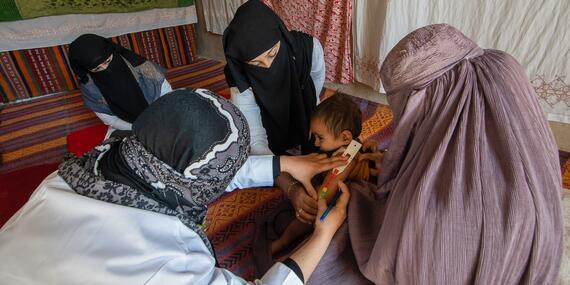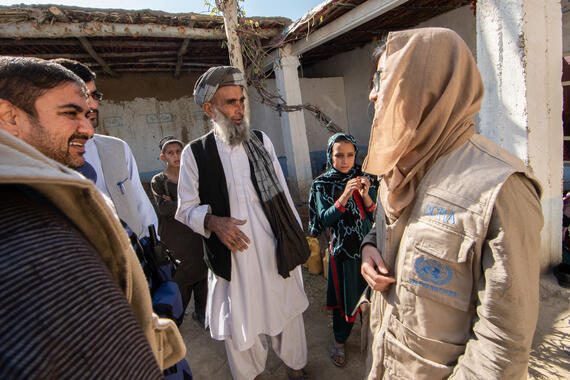Afghanistan: Local female humanitarian leader works in hope

“I once visited a poor rural village in northern Afghanistan, and as I interacted with the children there, one little boy who saw the work we do said to me: ‘My dream is to have food, go to school and have everything in my community!’” says Nazoana,* who shares the same dream.
Nazoana is in a leadership position with an international NGO (INGO). Almost 10 years ago, she completed her bachelor’s degree in computer science and found a job as a social worker with the INGO. But for her, it has never been “just a job.” At the time, her job entailed working closely with communities, from teachers to children and their parents, almost always taking on child protection cases. She chanced upon the position given that she had completed her studies and there wasn’t much room for Afghan women in information technology – her chosen profession.
After a year, Nazoana moved to an administrative role at a national NGO focusing on rural women’s activities. This led her back to the INGO she began her career with a decade ago, but this time as a Monitoring, Evaluation, Accountability and Learning Officer, from which she progressed to her current leadership role.
Nazoana has experienced considerable upheaval and change in Afghanistan over the past few years, but she tries to retain a positive, can-do attitude. Following the Taliban takeover in August 2021, Nazoana supported her female colleagues by transitioning their functions from office based to remote for a period. This enabled them to keep their jobs. But following regular and effective engagement with the de facto authorities, Nazoana secured the ability for her national female staff to work from both the office and the field. This ensured their continued access to affected communities, including women and girls.

Nazoana’s INGO works primarily on child-related issues, focusing on education, health care and nutrition, and protection from violence. It serves girls and boys, but it specializes in girls’ education in Afghanistan through a community-based education programme due to the impact of the 2021 ban on girls attending secondary school.
Violence against children remains a serious concern in Afghanistan, even though incidents have declined in recent years. The UN Secretary-General’s recent report to the Security Council on children and armed conflict in Afghanistan highlights that 4,519 grave violations against 3,545 children aged from just a few months old to 17 were verified between 1 January 2021 and 31 December 2022. As a result of these numbers, child protection measures are one of the INGO’s core functions, alongside static and mobile health support.
Working in her position, Nazoana also has an eye on the INGO’s fiscal matters, including its financial health. She says that its dwindling resources keep her awake at night. Like many country operations globally, the humanitarian response in Afghanistan is experiencing reduced donor contributions, which negatively affects programmes and staff morale. Nazoana has had to let go many of her staff from every level, and while she would like to keep them all, financial realities force her hand.
She plays over and over in her mind what would happen if international organizations – both the UN and NGOs – stop working in Afghanistan.
“Where would women work, and what would happen to the country? It doesn’t bear thinking about,” she says.
Nonetheless, Nazoana does her best to keep faith in the situation and in the future for herself and her Afghan sisters.
“Providing humanitarian assistance gives me satisfaction, and seeing the strong and brave Afghan women try to make a living even under these circumstances keeps me going,” she says. “I urge them to not lose sight, and to carry on with what we have achieved today, as there is hope and optimism for tomorrow.”
*Name has been changed.
